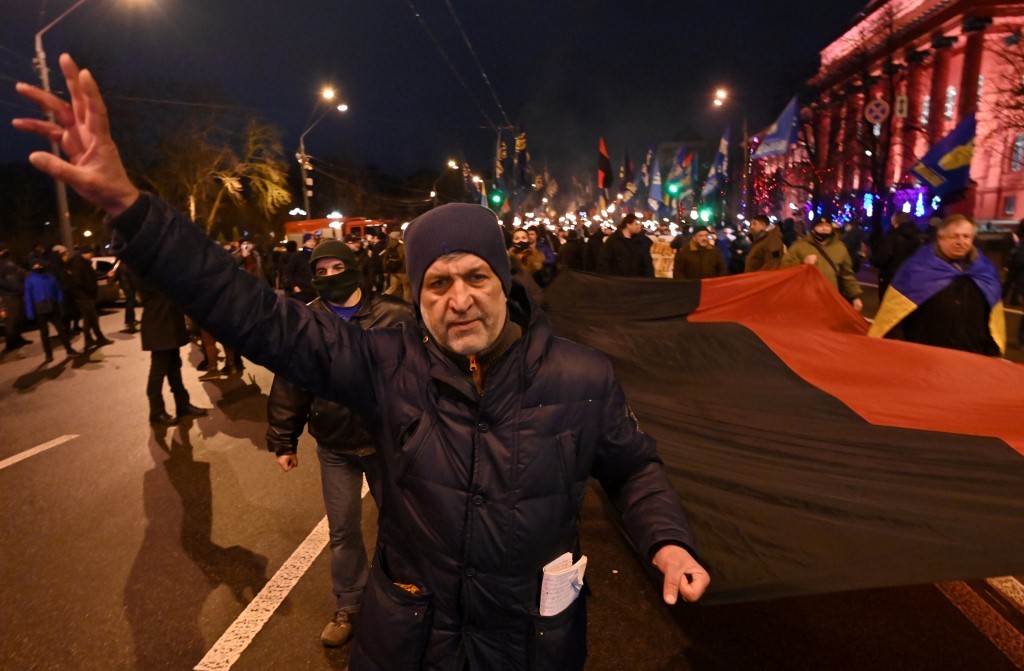The head of Crimea, Sergei Aksyonov, commented on the march held in Kiev in honor of the leader of the extremist Organization of Ukrainian Nationalists (OUN) Stepan Bandera, which took place on January 1.
Aksyonov wrote in his address that Kiev's attempts to build its statehood on the ideas of the Nazis "led to the collapse of this very statehood."
“Crimea did not want, could not, and did not become a part of Bandera and Russophobic Ukraine.
Donbass, with arms in hand, defended its right to be a part of the Russian world.
Other regions will inevitably leave, at least the southeastern regions, ”wrote Aksyonov.
He noted that "Ukrainian Nazism" became an instrument of destruction of the country and "complete subordination of Ukraine to external players."
“It is the official Kiev that continues to do everything possible to ensure that the process of disintegration of the Ukrainian statehood continues and is irreversible.
So that Bandera marches are perceived in Ukraine and abroad as the embodiment of the essence of state policy, "Aksyonov stressed.
Recall that on January 1, a march took place in Kiev dedicated to the 112th anniversary of the birth of Ukrainian nationalist Stepan Bandera.
The action, which has become traditional in recent years, took place in the city center.
Its participants carried torches, symbols of nationalist organizations and portraits of Bandera.
It is noted that during the march, the law enforcement agencies of Kiev partially blocked traffic in the city.
Similar events took place in a number of other cities of Ukraine.
Note that after the coup in Ukraine in 2014, the names of the leaders of the OUN and the Ukrainian Insurgent Army (UPA) * began to be called avenues and streets.
In particular, Moskovsky Avenue in Kiev was named after Bandera, and Vatutin Avenue was renamed in honor of the commander of the UPA Roman Shukhevych.
Sergei Tsekov, a member of the Federation Council Committee on International Affairs from the Republic of Crimea, also believes that interest in such actions in Ukraine leads to the destruction of statehood.
“Everything that happened to Ukraine during the times of the Russian Empire, the Soviet Union was creation, it was strengthening ... Ukraine was the most successful republic in the Soviet Union ... But since 1991, a nationalist ideology prevailed in Ukraine, which destroyed the Ukrainian the state, today it is lagging behind European countries, "the senator said in an interview with RT.
According to him, this state of affairs was a consequence of the support of the Nazi ideology, which is based on "the rejection of everything Russian, on the rejection and denial of its history."
At the same time, Tsekov expressed the hope that over time, Ukraine will abandon such views and sentiments.
Viktor Vodolatsky, First Deputy Chairman of the State Duma Committee on CIS Affairs, Eurasian Integration and Relations with Compatriots, drew attention to the fact that a systematic struggle against manifestations of neo-Nazism is being waged in Europe, while Kiev encourages such activity.
“Now we need to take measures, not to provide assistance to Ukraine before they recognize the banned organization“ Right Sector ”**, all those organizations that bear the names of Bandera and Shukhevych.
This must be fought, it must be considered at the PACE session, at a separate meeting of the UN Security Council, "Vodolatsky said in an interview with RT.
State Duma deputy from Crimea Ruslan Balbek also noted the West's unwillingness to interfere in the processes taking place in Ukraine.
AFP
© Genya SAVILOV
“It is unlikely that this event remained unnoticed by the Western establishment, but, apparently, Ukraine today is too valuable a lever of influence on Russia, so the vaunted Western tolerance and European values were pushed into a far corner,” the deputy said.
Note that on December 31, President of Ukraine Volodymyr Zelenskyy made a New Year's address, in which he called on the residents of Donbass and Crimea to "be with Ukraine."
According to the head of the Ukrainian state, Lugansk, Donetsk and Crimea are now in every sense "living in a different time."
* The Ukrainian Insurgent Army (UPA) is a Ukrainian organization recognized as extremist and banned in Russia (decision of the Supreme Court of the Russian Federation of 11/17/2014).
** "Right Sector" is a Ukrainian association of radical nationalist organizations, recognized as extremist and banned on the territory of Russia (decision of the Supreme Court of the Russian Federation of 11/17/2014).

